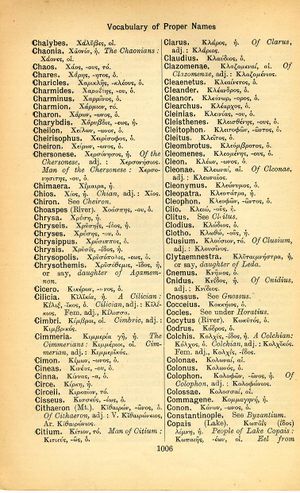Cicero: Difference between revisions
(6_3) |
(D_2) |
||
| Line 4: | Line 4: | ||
{{Lewis | {{Lewis | ||
|lshtext=<b>Cĭcĕro</b>: ōnis, m., = Κικέρων,<br /><b>I</b> a Roman [[cognomen]] in the [[gens]] [[Tullia]].<br /><b>I</b> M. [[Tullius]] [[Cicero]], the greatest of the Roman orators and writers; [[born]] on the 3d of January, 106 B.C. (648 A.U.C.), at [[Arpinum]] ([[hence]] Arpinae chartae, Mart. 10, 19, 17); assassinated, at the [[age]] of [[sixty]]-[[three]] years, by the soldiers of [[Antonius]], 43 B.C. (711 A.U.C.): [[ille]] se profecisse sciat, cui [[Cicero]] [[valde]] placebit, Quint. 10, 1, 112; Juv. 10, 114 al.— Hence,<br /> <b>B</b> Cĭcĕrōnĭānus, a, um, adj., Ciceronian: [[simplicitas]], Plin. praef. § 22: [[mensa]], id. 13, 16, 30, § 102: aquae, in the [[villa]] of [[Cicero]], at [[Puteoli]], [[medicinal]] to the eyes, id. 31, 2, 3, § 6.—Subst.: Ciceronianus es, non [[Christianus]], i. e. a [[follower]] of [[Cicero]], Hier. Ep. 22, n. 30.—<br /><b>II</b> Q. [[Tullius]] [[Cicero]], the [[brother]] of I., whose [[work]], De petitione consulatūs, is [[yet]] [[extant]]. | |lshtext=<b>Cĭcĕro</b>: ōnis, m., = Κικέρων,<br /><b>I</b> a Roman [[cognomen]] in the [[gens]] [[Tullia]].<br /><b>I</b> M. [[Tullius]] [[Cicero]], the greatest of the Roman orators and writers; [[born]] on the 3d of January, 106 B.C. (648 A.U.C.), at [[Arpinum]] ([[hence]] Arpinae chartae, Mart. 10, 19, 17); assassinated, at the [[age]] of [[sixty]]-[[three]] years, by the soldiers of [[Antonius]], 43 B.C. (711 A.U.C.): [[ille]] se profecisse sciat, cui [[Cicero]] [[valde]] placebit, Quint. 10, 1, 112; Juv. 10, 114 al.— Hence,<br /> <b>B</b> Cĭcĕrōnĭānus, a, um, adj., Ciceronian: [[simplicitas]], Plin. praef. § 22: [[mensa]], id. 13, 16, 30, § 102: aquae, in the [[villa]] of [[Cicero]], at [[Puteoli]], [[medicinal]] to the eyes, id. 31, 2, 3, § 6.—Subst.: Ciceronianus es, non [[Christianus]], i. e. a [[follower]] of [[Cicero]], Hier. Ep. 22, n. 30.—<br /><b>II</b> Q. [[Tullius]] [[Cicero]], the [[brother]] of I., whose [[work]], De petitione consulatūs, is [[yet]] [[extant]]. | ||
}} | |||
{{Gaffiot | |||
|gf=<b>Cĭcĕrō</b>,⁸ ōnis, m., M. [[Tullius]] Cicéron, l’orateur : Quint. 10, 1, 105 || [[Quintus]] Cicéron, son frère : Cic. Q. 1, 1 || [[Marcus]], son fils : Cic. Att. 16, 3, 2 || [[Quintus]], son neveu : Cic. Att. 16, 1, 6 || [fig.] <b>Cĭcĕrōnēs</b> Sen. Clem. 1, 10, 1, des Cicérons. | |||
}} | }} | ||
Revision as of 06:34, 14 August 2017
English > Greek (Woodhouse)
Κικέρων, -ωνος, ὁ.
Latin > English (Lewis & Short)
Cĭcĕro: ōnis, m., = Κικέρων,
I a Roman cognomen in the gens Tullia.
I M. Tullius Cicero, the greatest of the Roman orators and writers; born on the 3d of January, 106 B.C. (648 A.U.C.), at Arpinum (hence Arpinae chartae, Mart. 10, 19, 17); assassinated, at the age of sixty-three years, by the soldiers of Antonius, 43 B.C. (711 A.U.C.): ille se profecisse sciat, cui Cicero valde placebit, Quint. 10, 1, 112; Juv. 10, 114 al.— Hence,
B Cĭcĕrōnĭānus, a, um, adj., Ciceronian: simplicitas, Plin. praef. § 22: mensa, id. 13, 16, 30, § 102: aquae, in the villa of Cicero, at Puteoli, medicinal to the eyes, id. 31, 2, 3, § 6.—Subst.: Ciceronianus es, non Christianus, i. e. a follower of Cicero, Hier. Ep. 22, n. 30.—
II Q. Tullius Cicero, the brother of I., whose work, De petitione consulatūs, is yet extant.
Latin > French (Gaffiot 2016)
Cĭcĕrō,⁸ ōnis, m., M. Tullius Cicéron, l’orateur : Quint. 10, 1, 105

